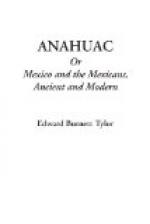wares that were made three centuries ago; and there
is no improvement in their manufacture. This
people, who rose in three centuries from the condition
of wandering savages to a height of civilization that
has no equal in history—considering the
shortness of the time in which it grew up—have
remained, since the Conquest, without making one step
in advance. They hardly understand any reason
for what they do, except that their ancestors did things
so—they therefore must be right. They
make their unglazed pottery, and carry it five and
twenty miles to market on their heads, just as they
used to do when there were no beasts of burden in
the country. The same with their fruits and vegetables,
which they have brought great distances, up the most
difficult mountain-paths, at a ruinous sacrifice of
time and trouble, considering what a miserable sum
they will get for them after all, and how much even
of this will be spent in brandy. By working on
a hacienda they would get double what their labour
produces in this way, but they do not understand this
kind of reasoning. They cultivate their little
patches of maize, by putting a sharp stick into the
ground, and dropping the seed into the hole.
They carry pots of water to irrigate their ground
with, instead of digging trenches. This is the
more curious, as at the time of the Conquest irrigation
was much practised by the Aztecs in the plains, and
remains of water-canals still exist, showing that
they had carried the art to great perfection.
They bring logs of wood over the mountains by harnessing
horses or mules to them, and dragging them with immense
labour over the rough ground. The idea of wheels
or rollers has either not occurred to them, or is considered
as a pernicious novelty.
It is very striking to see how, while Europeans are
bringing the newest machinery and the most advanced
arts into the country, there is scarcely any symptom
of improvement among the people, who still hold firmly
to the wisdom of their ancestors. An American
author, Mayer, quotes a story of a certain people
in Italy, as an illustration of the feeling of the
Indians in Mexico respecting improvements. In
this district, he says that the peasants loaded their
panniers with vegetables on one side, and balanced
the opposite pannier by filling it with stones; and
when a traveller pointed out the advantage to be gained
by loading both panniers with vegetables, he was answered
that their forefathers from time immemorial had so
carried their produce to market, that they were wise
and good men, and that a stranger showed very little
understanding or decency who interfered in the established
customs of a country. I need hardly say that the
Indians are utterly ignorant; and this of course accounts
to a great extent for their obstinate conservatism.




